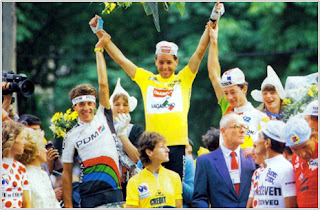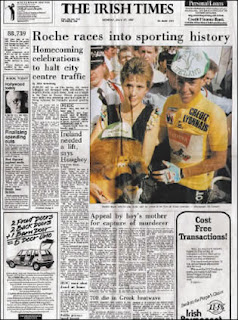1987, Part Nine: We’ll always have Paris

http://www.cyclismas.com/biscuits/1987-part-nine-well-always-have-paris/ By fmk · On July 13, 2012 The 1987 Tour enters it’s final weekend. The Tour Féminin likewise draws to a close. Twenty-five years on, how should 1987 be remembered today? The 1987 Tour de France’s final transition stage saw the peloton tackling the 225 kilometres from St Julien en Genevois to Dijon. The riders took things easy until an eight man break got away thirty-some kilometres out from home, containing Panasonic’s Henk Lubberding (architect of the attack) and his team-mate Eric van Lanker along with Jean Claude Leclercq (Toshiba), Frédéric Brun (Z), Régis Clère (Teka), Alfred Achermann (Kas), Rudy Patry (Roland) and Gerrie Knetemann (PDM). In the final kilo Clère, ever the escape artist, managed to break free of his brothers in arms and held on by three seconds to take the stage. For Teka it was back-to-back stage and for Clère it was a second stage victory, following Millau. Superconfex’s J...



